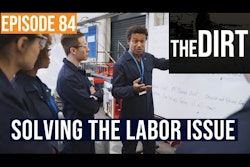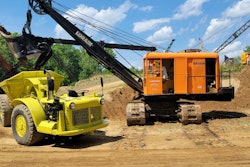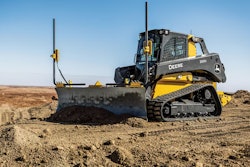In this episode of The Dirt, host Bryan Furnace talks with Tyler Robertson, CEO of Diesel Laptops and an advocate for equipment right to repair.
Robertson discusses Massachusetts’ automotive right-to-repair law passed by voters in 2020. Since its passage, the law’s enactment has been stalled due to legal battles between automotive manufacturers seeking to block the law and supporters who want independent mechanics to have access to OEM diagnostic and technical information so they can perform repairs on newer models.
So far, the issue hasn’t been as prominent for construction equipment as for the automotive, electronics and agricultural industries, but as right-to-repair legislation catches on, it could gain steam.
So if you want to learn more about right to repair and what it could mean for your construction equipment, check out this week’s episode of The Dirt.
Also, if you should also want a deeper look into the issue as it relates to construction equipment, check out this article on equipmentworld.com.
Equipment World serves up weekly videos on the latest in construction equipment, work trucks and pickup trucks – everything contractors need to get their work done. Subscribe and visit us at equipmentworld.com!
In this episode:
00:00 Intro to Right to Repair
01:28 What is Right to Repair?
03:30 Arguments against Right to Repair
07:23 OEM’s and intellectual property
09:04 Can intellectual property be protected?
10:49 How can contractors get involved?
12:11 When will there be a ruling on Right to Repair?
15:02 Wrap up on Right to Repair
Bryan Furnace (00:00):
Hi, everybody, and welcome back to Equipment World. You are watching The Dirt. I'm your host, Bryan. And today, we're going to talk about the Right to Repair issue. If you haven't been following this, this has been an ongoing dialogue for a handful of years now. And essentially what it boils down to is manufacturers don't want people working on their equipment, because of the claim that it's interfering with intellectual property. If they were to give you access to all of the stuff behind the scenes on these new pieces of equipment, then all of the sudden, their intellectual property can be compromised.
Bryan Furnace (00:40):
Now, the other side of the equation is we have a bunch of mechanics and owners of equipment that want to be able to fix their stuff without having a technician out and paying a bunch of money to have them plug into it with a laptop. Here to talk about this issue with us today is Tyler Robertson of Diesel Laptops. He actually helps train technicians, helps give them some of the tools to actually go out and fix some of this equipment. And he is an expert in this area of the industry. So without further ado, let's flip over to my interview with Tyler.
Tyler Robertson (01:10):
I am excited to be here on The Dirt. This is going to be, I think, a great conversation.
Bryan Furnace (01:14):
Yeah, absolutely. So the first question I have for you is, for people who haven't necessarily been following the whole Right to Repair discussion, can you give kind of a brief overview as to what that discussion is and why there's so much controversy around it?
Tyler Robertson (01:28):
Yeah. And I'll keep it in the realm of heavy duty, because I think there's automotive and Right to Repair phones and all these other things. But people need to understand, for heavy duty, currently all we have is the heavy duty Memorandum of Understanding that was signed back in 2012. And it was really a bunch of promises, nothing legally binding, just a bunch of agreements and it really didn't catch anywhere. And what's happened recently is a Right to Repair Act came up for vote by Massachusetts voters in early 2021. And the reason that came up to vote was the previous Right to Repair laws and acts that are in place had to deal with automotive and had to deal with the OBD2 connector. And they specifically said they need to be able to grab data off the OBD2 connector.
Tyler Robertson (02:12):
But as we all know, the world's changed. Now we have telematics. We have devices doing data over the air. And basically, Massachusetts went back to the voters and said, "We need to force all of these manufacturers to provide over the air information. We shouldn't be beholden to OEM websites and all these other things. Let's go pass this law." So in early 2021, Massachusetts, the law went to vote by the voters and over 75% of them voted yes. And that kind of set off a whole chain of lawsuits, indecisions, delays, and all the other things that have been happening ever since that point.
Bryan Furnace (02:48):
So even higher level than recent legislation, essentially, we're talking about the ability for you and I to be able to work on a manufacturer's piece of equipment without necessarily getting the manufacturer involved, correct?
Tyler Robertson (03:01):
To simplify Right to Repair, it's preserving our market choice. We're the market. We're the consumers. We want to choose where to get our cars fixed, where to get our phones fixed, where to do these things. And the OEMs, typically, the manufacturers, are the ones saying, "No, no, no, we're not going to let you do that." And they have a multitude of reasons, that we can get into, but they're the ones pushing back on it. And it's really up to consumers using their votes, using their voice to go push forth what should be their right to preserve that market choice.
Bryan Furnace (03:30):
It sounds to me, at a very high level, this is kind of a no brainer. Everyone should be able to get their stuff worked on wherever they want. Now, what are some of the counterarguments? What are some of the arguments against Right to Repair?
Tyler Robertson (03:42):
So almost immediately after this was passed in Massachusetts, the automakers, and there's an Association of Automakers, they got together and they were fighting it to begin with, with ads on TV and whatever. They came out and said, "Well, we're going to have to do a lawsuit to block this, because it's supposed to take effect for next model year. And we have a couple problems. Problem number one is that this is an impossible task. You are asking us, all of us manufacturers, to provide an option for you to get data off of our vehicles over the air, without using our websites and our platforms. This is impossible. We can't do this. Not only that, but we believe it would violate federal safety laws and we believe it would violate environmental laws." So this is just a classic case of someone not liking the way the voters did and throwing a bunch of attorneys and throwing the book at them and saying, "We have all these problems.
Tyler Robertson (04:32):
We can't even do what you're asking us to do," which obviously upset a lot of the voters in Massachusetts. And this isn't a Massachusetts thing. What Massachusetts does the rest of the United States follows. And there's a lot of groups lobbying on both sides of this. So it's a very exciting, interesting time, seeing how they're fighting about this, but that lawsuit happened by the manufacturers right after mid 2021. And it's been a drag ever since. So in June of 2021, a judge heard both sides and said, "Okay, we'll make an announcement soon." He then quickly came out and said, "Nope, I can't make an announcement. We have COVID issues. We have criminal cases. We have a lot of things to deal with." And it wasn't until almost a year later, in April of this year, 2022, he came out and said, "Oh, I've completed my findings. I will now rule by July 1st." Well, July 1st rolls around.
Tyler Robertson (05:26):
And he is like, "Well, new information's come to light. There's been more lawsuits with West Virginia and the EPA and these other things. Now we need to delay again." He announced on September, August 5th, now they're going to do yet another hearing behind closed doors September 1st. So these guys have already been to court a couple times, fought through these things. And there's still no resolution. There is a law in place, but the attorney general has said, "I'm not going to uphold the law, because of all the lawsuits going on." And it just gets drug out and drug out and drug out. In the meantime, the ones that are really suffering are the consumers, because they don't have a choice still, in the matter.
Bryan Furnace (06:01):
A lot of that sounds like a giant smoke show. Like you said, it's a bunch of attorney jargon for, "We don't want to do it. So we're just going to throw a bunch of things at you. So you think we can't do it."
Are there some genuine arguments against Right to Repair? Are there any real reasons some of these manufacturers don't want Right to Repair to go through?
Tyler Robertson (07:32):
Well, besides profits, I can't think of one.
Bryan Furnace (07:34):
Sure. There's that.
Tyler Robertson (07:37):
So they're being asked to do some difficult things. There's no doubt about it, but they've known about this forever. This isn't like something new. The only reason this even came up to vote again is because everything got off the OBD port, OBD2 port, and went to 5G and wireless and all these things. So it's something new they had to do. And what's been interesting is a couple automotive manufacturers have actually said, "Oh, you know what? We're actually going to uphold this rule. We're just going to disable our telematics over the air stuff. And now, it doesn't apply to us."
Bryan Furnace (08:08):
"Now it's not a problem."
Tyler Robertson (08:09):
Lawsuit thing. It's funny because some manufacturers said, "Well, if you have access to these things, you'll steal our intellectual property." That's the leap they're trying to make is saying, "If you have access to your own data, you're going to steal our intellectual property."
Tyler Robertson (08:24):
It's a really a poor argument to be saying these things. And really that's what it really comes down to a lot is the OEMs. I'm in the aftermarket business. That's what Diesel Laptops is. They believe we should only be the ones that have access to all this information and all the technology and all the tools to actually work on our own things. And the dealers that they have want that as well, because it gives them business. So there's companies like ours who go out there and we have to reverse engineer things. We have to figure how things work. We have to make our own solutions. And at the end of the day, the aftermarket world would not exist if the OEM world was taking care of their customers. And they're not. That's why the aftermarket world exists in a lot of cases.
Bryan Furnace (09:04):
Going back to the intellectual property argument, because that is, in my mind, one of the few arguments that, at surface level, sounds like a reasonable argument. But you just said that it's not really. It doesn't hold any weight. So is there a way that these manufacturers could allow you to get in with a laptop, actually work on the equipment, while still protecting intellectual property?
Tyler Robertson (09:25):
The OEMs make the argument this is a safety issue. This is an environmental issue. This is a security issue. And I can tell you the whole aftermarket world is "We want security. We want safety. We want environmental." We're not arguing any of those points. None of us are. It's just reasoning through that. So some things have already been done. So for example, with FCA, which is the old Chrysler, in order for diagnostic tools today to do a lot of diagnostic commands, that diagnostic tool needs to talk to FCA servers. And each user has to pay a minimal fee like 50 bucks a year. And then, that tool has access to go to that site to validate that this is a legit tool, that is safe. It is secure and can do the things that it's supposed to do. So they've set up that process and it sucks that the users have to pay an extra 50 bucks a year and go through a couple more loopholes. But it was their way to ensure safety and security of aftermarket tools. So it's a variable doable thing. And their arguments are really just insane.
Bryan Furnace (10:24):
Far fetched.
Tyler Robertson (10:25):
Yeah. It's just throwing things at the wall, see what sticks, delay, delay, delay. Typical big corporation. I'm going to go fight everything and throw a bunch of money and attorneys at it. And that's what they're doing. But at the end of the day, I think the consumers win. People need to realize that these associations are fighting the Right to Repair. They're fighting for us. They're fighting for the little guys. They're fighting for the people that want to have choices in the market, on what they do with their equipment.
Bryan Furnace (10:49):
Let me ask you this, as a contractor, as one of the little guys, is there anything that I could do to potentially get involved in this argument or make my voice be heard?
Tyler Robertson (10:58):
So if you go to some, so first of all, if the people at Google, like Massachusetts Right to Repair, there's a whole bunch of different associations that are all fighting for the little guys, so to speak. They hold plenty of webinars. There's all kinds of information on there. There's ways to get in touch with your legislators. There's letters, the templates you can write and do these things, and they need support. They need a lot of it. And I don't think they even ask for donations. They just want a army of people out there talking and letting their elected officials know "This is important to me as a consumer." And I think most politicians are in the people's pocket.
Tyler Robertson (11:36):
They're the people casting the votes. The OEMs don't cast votes. The people that work there cast the votes. So overwhelmingly, every time these things come up for debate, they come up for laws or votes, they always win. And it just goes to speak, this is what people want. And if people don't get involved, it's like you can't sit there and complain about it when you don't have a choice where to get your vehicle fixed and you have to go to the dealer, you have to bring your phone to the iPhone store, or back to Android or whatever. This is what it's all about. And this conversation takes place across a multitude of industries that are all fighting together.
Bryan Furnace (12:11):
So my final question for you is, do we, at this point in time, have any reasonable feel for when we could hear on a ruling? And are we expecting them to rule in favor of Right to Repair? Or any thoughts on that?
Tyler Robertson (12:26):
Yeah. So I've talked to people on both sides, so I can tell you all the people for Right to Repair are very confident that they're going to win. And all the people that are fighting against are very confident they're going to win. So typical attorneys going to battle. I think the only one's winning here are actually the attorneys on both sides, but that's a whole other point. So it's going to be interesting. So yeah, September 1st is a closed door hearing. We won't know what's said in there, unless someone leaks it or talks about it. My guess is September 1st happens, new evidence, new arguments, new whatever. This thing's going to keep getting delayed for quite a while. And everyone's getting frustrated at it. Eventually, some things could happen. The attorney general in Massachusetts could say, "You know what? Forget the lawsuits."
Tyler Robertson (13:08):
He has, I believe it's like a 14 or 15 day notice, he has to give to say, he can start upholding the law, regardless of the pending lawsuit. So they can pull that trigger if they want to. But again, it's just going to take people being involved and talking about this and making sure everyone knows about it and fighting for what they believe are their rights to do things. So I'll be surprised if there's actually a decision made by this judge this year. Even if there is, my guess is there's more lawsuits, more appeals, more of all this legal jargon. And I'm not an expert in that area. I just know what I see and hear in front of me. So it'll be interesting point, but I will tell the audience this, there are options that exist in the marketplace already that are there, that are really, really good.
Tyler Robertson (13:52):
This is just really making the OEMs legally have to do some things. So there's companies like mine in the heavy duty world, you have Snap-on, you got Mac tools, you got us, you got Nexiq, you got [inaudible 00:14:05]. All these tools. All of us guys are reverse engineering without manufactured permission, in most cases, and building our own software to do things. And that's perfectly legal. And that is the way it's been for a long time. Even when this passes, it's not like the OEMs are going to be like, "Hey guys, here's all the software for free to go do all these things."
Bryan Furnace (14:22):
"We're going to be helpful now."
Tyler Robertson (14:26):
I'll go back to what I started with, that heavy duty of Memorandum Act that was signed almost 10 years ago now, it was a big applause, a bunch of press releases. I got a big to do. I can tell you, 10 years later, it didn't do anything. So the world hasn't changed. It's still hard to get all the software. It's hard to get all the repair information. It's hard to uphold these guys to something they signed 10 years ago. It needs legislation to really push it forward and force them to be more helpful and open the doors up for all this need that's out there for diagnostics, repair information, parts information, and everything else we all want for anything we own in our lives that we care to fix ourselves.
Bryan Furnace (15:02):
Well, Tyler, this has been really interesting. I had a very surface level understanding of Right to Repair. Now I feel like I'm starting to get into a little meat, so I appreciate your time
Tyler Robertson (15:12):
Yeah. No problem. It's been an exciting thing for me. That's what my whole company does, and I get asked this question a lot by a lot of our customers and strategic partners. It's an important thing. Get involved. If you get anything out of this conversation, people listening, get involved. There is definitely something you can do to help the situation.
Bryan Furnace (15:27):
Well, thank you again for, Tyler, being willing to come on and chat with us about the Right for Repair issue. If you haven't been following the dialogue, it's easy to kind of not really know where you stand on the issue, but hopefully, today's conversation has given you a little insight as to the ongoing dialogue and maybe giving you an idea of where you stand on the issue. So with that being said, as always, thanks for watching. We'll catch you guys on the next episode of The Dirt.









